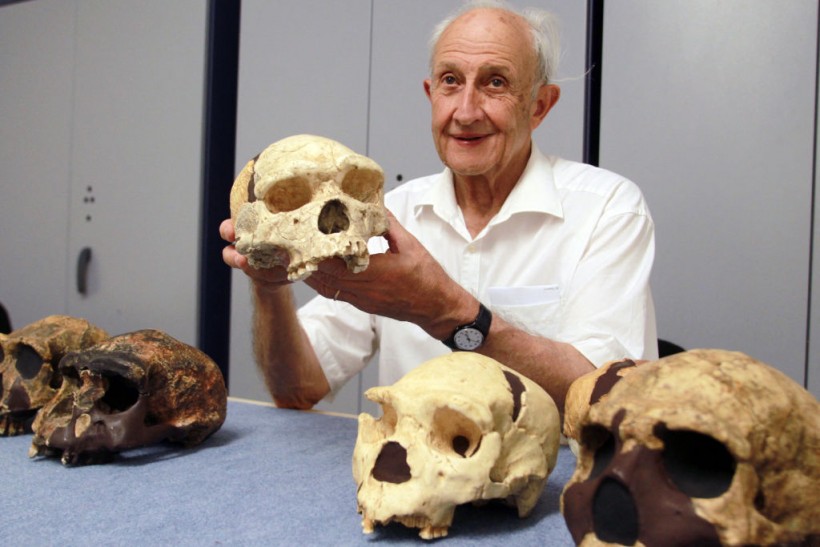An extreme cooling event probably caused the extinction of Europe's early Homo erectus. The study, titled "Extreme glacial cooling likely led to hominin depopulation of Europe in the Early Pleistocene" published in Science, suggests Homo erectus reached Europe from Asia between 1.8 and 1.4 million years ago but vanished around 1.1 million years ago.

French paleontologist Henri De Lumley shows a skull uncovered in 1971 at the prehistoric site of Caune de l'Arago in Tautavel on July 16, 2013.
Solving the Gap of Hominin Habitation
The subsequent signs of archaic human presence in Europe emerged roughly 900,000 years ago, potentially linked to the arrival of Homo antecessor from Africa or Asia.
Paleoclimatologist Chronis Tzedakis, the study's senior author from University College London, pointed out that there is a 200,000-year gap coinciding with a cooling phase indicates that the cold possibly caused the disappearance of ancient humans.
The team detected signs of cooling in sediment cores extracted from the ocean floor near Portugal, as evidenced by elemental isotopes in marine plankton remains and pollen analysis of land-based vegetation, revealing an abrupt cooling event around 1.15 million years ago.
This cooling is believed to have caused a substantial drop in water temperature near Lisbon, reaching approximately 43°F (6°C) from the current average of 70°F (21°C), concurrently with a cold phase affecting Europe's landmass, potentially leading to the southward advancement of its northern ice sheets.
Additionally, the study pointed to a sustained influx of cold water starting roughly 1.13 million years ago, attributed to melting ice sheets in Europe due to continent-wide warming.
While prior timelines suggested a peak ice age around 900,000 years ago, this research provided the first tangible evidence of an earlier cooling period around 1.1 million years ago, possibly linked to Jupiter's gravitational influence on Earth's orbit, which was then nearly circular around the sun, a pattern associated with other historical cooling episodes in the planet's climate.
During this period, Earth's atmosphere also experienced a notable decline in carbon dioxide levels, although whether this reduction caused the cooling or this resulted from it remains uncertain, according to Chronis Tzedakis, the lead author of the study.
Ancient Humans of Europe
The study reveals an extreme cooling event that rendered Europe too cold for archaic humans, impacting their ability to find food due to reduced plant and animal survival. Additionally, archaic humans lacked adaptations for cold climates, lacking fat insulation, effective clothing, and fire-making abilities.
The research suggests that these challenges likely led to lower population resilience, potentially resulting in regional abandonment and even extinction of early human populations in the face of this deteriorating environment. But who were these ancient humans in Europe?
Homo antecessor, discovered in Spain and dated back 850,000 years, likely represents the earliest human presence in Europe. Roughly 250,000 years later, Homo heidelbergensis emerged in Germany, believed to be a direct ancestor of modern humans.
Meanwhile, Neanderthals arrived in Spain around 430,000 years ago, with continued migrations from Africa for 200,000 years, adapting to glacial periods by creating clothing, igniting fires, and preserving food.
Homo sapiens arrived in Europe about 200,000 years ago, followed by larger groups around 60,000 years ago, successfully enduring the last glacial maximum between 26,500 and 15,000 years ago.
Moreover, less adaptable Homo erectus thrived in warmer Asian regions for over a million years after the North Atlantic cooling event, eventually becoming extinct on Java island around 100,000 years ago, marking the end of their presence across Eurasia.
RELATED ARTICLE: Ancient Humans Had Bigger Bodies to Combat the Cold; Will Changing Climate Shrink Present Humans?
Check out more news and information on Anthropology in Science Times.














